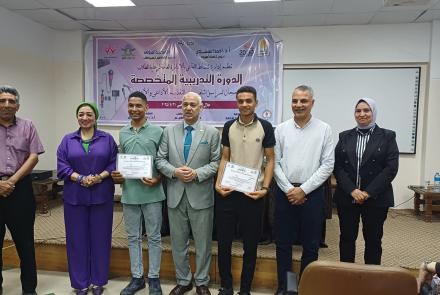- Dr. El-Minshawy: we appreciate the fruitful cooperation with the Administrative Control Authority and the National Anti-Corruption Academy
- Dr. El-Minshawy: the political leadership has put building the Egyptian human being at the forefront of its priorities"
- President of Assiut University: the training program is an important step towards strengthening governance within the University
Dr. Ahmed El-Minshawy, president of Assiut University, witnessed on Tuesday, April 15, the closing events of the second phase of the specialized training program for university administrative staff in the fields of governance and anti-corruption, which was organized by the University in cooperation with the National Academy for anti-corruption and the Administrative Control Authority, in the presence of Major General Sherif Ramzi, head of the administrative control office in Assiut, and under the supervision of Colonel Fouad Darwish, representative of the National Anti-Corruption Academy.
The program was held under the follow-up of Dr. Mohammed Adawi, advisor to the president of the University for Alumni Affairs, entrepreneurship and Innovation and director of the Center for Future Studies, Professor Shawkat Saber, secretary general of the University, and Dr. Mustafa Morsi, coordinator of the National Academy at the University, in the presence of Dr. Amal Al-Faqi, lecturer at the Faculty of Graduate Studies at the Arab Academy for science and technology.
In his speech, Dr. Ahmed El-Minshawy expressed his deep thanks and appreciation to Major General Sherif Ramzi, head of the administrative control office in Assiut, and Colonel Fouad Darwish, representative of the National Anti-Corruption Academy, praising their outstanding efforts, their diligent follow-up and their great support, which had the greatest impact on the success of the training program activities. He stressed that this distinguished participation reflects the keenness of the Egyptian state to enhance institutional awareness and consolidate the principles of transparency and integrity in its various institutions.
Dr. El-Minshawy praised the level of the training program and the specialized content and important lectures provided by a group of experts from the National Anti-Corruption Academy, pointing to the participation of about 75 employees of the University's administrative staff, and appreciated the efforts of all those responsible for organizing and supporting.
The president of the University pointed out that the close cooperation between Assiut University and the competent regulatory authorities represents a strong pillar to spread the culture of governance, and confirmation of the University's keenness to adhere to the principles of transparency and efficiency in performance, in support of the vision of the Egyptian state and its national strategy to combat corruption, and building a modern state based on the foundations of integrity and institutional justice.
Dr. El-Minshawy also stressed the University's commitment to be a key party in the development process, through the development of human cadres, spreading the culture of awareness and institutional affiliation, expressing his appreciation for the pivotal role played by the Administrative Control Authority in preventing and combating corruption in all its forms.
The president of the University touched upon the achievements achieved in various fields, especially in the higher education and scientific research sector, stressing that the remarkable progress witnessed by the country reflects the interest of the political leadership in building people and modernizing the education system, through expanding the establishment of private universities, and the trend towards fourth-generation universities, in line with the requirements of the Times and serves the goals of sustainable development.
The events concluded with the exchange of commemorative shields between Dr. Ahmed El-Minshawy, president of Assiut University, and Major General Sherif Ramzi, head of the administrative control office in Assiut, and certificates of appreciation were distributed to the participants from the administrative apparatus, presented by the National Anti-Corruption Academy.
The training program, which lasted for three days, included a series of important lectures, the first day of which dealt with the definition of the role of the Administrative Control Authority and the information infrastructure project of the Egyptian state, while the second day included topics on Egypt's Vision 2030, corruption and its impact on national security, and the third day dealt with the concepts of governance in the face of corruption, management ethics, and institutional work.


 Do you have any questions?
Do you have any questions? 





